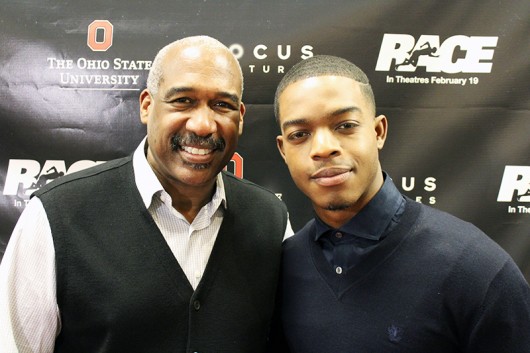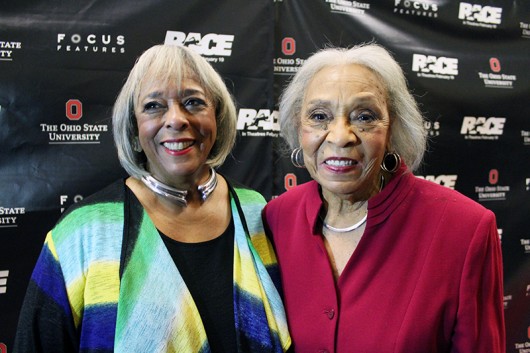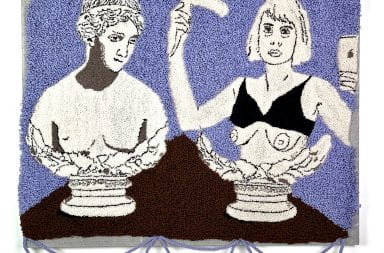Facing adversity throughout his life, Jesse Owens never lost sight of his goal to be the fastest man on the planet. Fighting through discrimination, “The Buckeye Bullet” ultimately won four Olympic gold medals in Berlin in 1936, breaking down barriers of race years before the Civil Rights movement.
To honor the late Owens, Ohio State held a special advanced screening of the biographic movie “Race” in the Mershon Auditorium on Monday at 7 p.m. The red carpet preview screening included appearances from the film’s star, Stephan James, Owens’ daughters and OSU President Michael Drake, who delivered a pre-movie speech.
“It’s been nearly 80 years since he burst onto the Olympic stage and did that in breathtaking fashion with memories of his legacy that live on, even ‘til this day,” Drake said. “There were very few African-Americans in the day that could compete on equal footing and compete on merit. The country was segregated in so many ways that, in fact, when Jesse was a student here at Ohio State University, he couldn’t live in the dorms or eat in restaurants on High Street. But he persevered through those times and through his great talents really set an example for the world.”
James, who plays Owens in the film, said portraying the track and field legend was an honor.
“Everything, it means everything,” James said. “For me to be charged with the responsibility of reinvigorating his life and his legacy to people, I think that’s very, very special. It’s special that we don’t let heroes like him die or be forgotten. I feel very, very lucky to be the one who gets to retell his story 80 years later.”

OSU Director of Athletics and Vice President Gene Smith and actor Stephan James, who plays Jesse Owens in the movie “Race,” at the Feb. 15 showing at the Mershon Auditorium. Credit: Michael Huson / Campus Editor
Owens daughters, Gloria Owens Hemphill and Marlene Owens Rankin, said their father lived his life as a fair, loyal and kind man, who always was considerate of others — regardless of who they were, what they did or what race they were.
Owens Rankin said she was excited to have the film screening at OSU, as her father would have been proud to have the showing at the university to which he was so loyal. She said the film will open viewers’ eyes to what her father had to deal with.
“They’re going to learn a lot of the things that happened,” Owens Hemphill said. “They will see what he sacrificed for and how he accomplished what he did with what he had to put up with. I think a lot of people don’t know that. And when they see the things that happened that could have stopped him from achieving the goal, they’ll understand how important it is if you have a goal, and (if you) really want to achieve it, you can.”
For James, preparing for the role began almost immediately, as he had to be in optimal cardiovascular shape. He said that he linked up with a track coach at Georgia Tech and began running every day. He then studied Owens’ mannerisms as a runner, including his stride and his facial expressions.
James said that he hopes his performance in the film will provide inspiration for viewers the same way that Owens did in real life.
“There (are) so many people who I’ve met that have been inspired by that,” James said. “In turn, they are able to inspire other people. It trickles down, it has such a rippling effect that it’s so important that we keep his story alive and his legacy alive. I’ve personally spoken to guys like Justin Gatlin and Usain Bolt who told me that they’ve been directly affected by him. So, that to me is so telling because now those guys have the responsibility of continuing to inspire people the same way they were inspired by him. It’s very important that we keep legends like him from being forgotten.”
James said he wants viewers to take not only the story of Owens’ plight with them after seeing the movie, but to draw motivation for themselves that they too can achieve their goals.
“Just go see it to be inspired,” James said. “Inspired by a man who did extraordinary things during an extraordinary time. He stared in the face of adversity, not only here in America, but also in Berlin, Germany in 1936. People really have to look at Jesse and think if he could do what he did at a time and a place and under the circumstances in which he did it, then there really is no excuse for me not to be great, myself.”
The Mershon Auditorium, located inside the Wexner Center for the Arts at OSU, was at full capacity for the screening, a total of 2,200 seats, including 250 of OSU’s student athletes. Stephanie Hightower, president of USA Track and Field, was in attendance, and said she looked up to Owens as a fellow Buckeye and Columbus native.

Marlene Owens Rankin and Gloria Owens Hemphill, Jesse Owen’s daughters, at the Feb. 15 showing of the movie “Race” at the Mershon Auditorium. Credit: Michael Huson / Campus Editor
“He is a role model that all of us want to aspire to be like,” Hightower said. “He set the bar and the standard for perseverance and nobody else has ever set that bar higher.”
Javaune Adams-Gaston, vice president of student life at OSU, was also in attendance and said that Owens’ legacy lives on as a message to OSU’s current students.
“His legacy is one of excellence, he was an outstanding individual and an outstanding team member,” she said. “So, learning how to be part of a team that makes a difference and changes the world – that’s what this is really all about – that our students can be world changers, too.”
Drake said the university has a collection of artifacts of Owens’ from the 1936 Berlin games, including four replica gold medals, his Olympic diary and his personal camera. The display can be seen through Feb. 23 on the ground floor of the Thompson Library.
“Race” will partially portray Owens’ time at OSU and training with his real-life coach Larry Snyder, who is played by Jason Sudeikis, culminating with Owens’ moment of triumph in the 100-meter, 200-meter, long jump and 400-meter relay. At the time, Owens’ performances set three world records and tied a fourth, according to OSU library records. His biggest triumph, however, came in disproving Adolf Hitler’s theories of Aryan supremacy.
“Race” is set to release in theaters nationally on Friday, and Owens Rankin said moviegoers should see the film to learn more about history, in order to appreciate the way things are today.
“Take a page out of history, understand what it was like then,” she said. “To know that it was a difficult time for a lot of people. Learn your history, so that it doesn’t repeat itself.”


